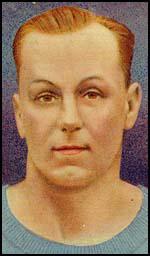Fred Tilson

Samuel (Fred) Tilson was born in Barnsley on 19th April 1903. He played local football before joining the Second Division club Barnsley in 1926. Playing at inside-forward, Tilson scored 23 goals in 61 games.
In 1928 Tilson and his friend Eric Brook, joined Manchester City for a joint fee of £6,000. That season the club won the Second Division championship. Brook only made 6 appearances that season.
Unlike his friend, Eric Brook, Tilson failed to establish himself as a regular member of the first-team. However, he still managed to score 12 goals that season.
Manchester City finished in 3rd place in the 1929-30 season. Tilson was in and out of the side but when he was selected he did well scoring 7 goals in 11 games. It was not until the 1931-32 season that he made the inside-left position his own with 13 goals in 37 games. The following season he was switched to centre-forward and rewarded the club by scoring 17 goals in 29 games.
Manchester City enjoyed a good FA Cup run in 1932-33 season. Fred Tilson scored a hat-trick in the club's 9-0 victory over Gateshead. Eric Brook scored both goals against Walsall (2-0) and a hat-trick against Bolton Wanderers (4-2). Tilson scored against Burnley (1-0) and Derby County (3-2) and Manchester City had reached the final at Wembley. The Everton team that day included players such as Dixie Dean, Cliff Britton, Ted Sager and Albert Geldard. With Tilson missing because of injury, City lost the game 3-0.
In the 1933-34 season Manchester City finished 5th in the First Division of the Football League. The club also enjoyed a good FA Cup run in the 1933-34 season beating Blackburn Rovers (3-1), Hull City (4-1), Sheffield Wednesday (2-0), Stoke City (1-0), Aston Villa (6-1) to reach the final against Portsmouth. On the way to Wembley the goals had been scored by Fred Tilson (7), Alec Herd (4) and Eric Brook (3). The defence, that included players such as Frank Swift, Sam Cowan, Jackie Bray and Matt Busby also performed well.
Manchester City played Portsmouth in the final at Wembley. Tilson had such a terrible injury record that when Sam Cowan introduced him to George VI before the game, he said: "This is Tilson, your Majesty. He's playing today with two broken legs." It was a good job that Tilson did play as he scored both of the goals in the 2-1 victory to increase his total to nine in eight cup games that season.
Fred Tilson won his first international cap for England against Hungary on 10th May 1934. The England team that day included Raich Carter, Cliff Bastin, Eric Brook, Tom Cooper, Sammy Crooks and Eddie Hapgood. Tilson scored in the 84th minute but Hungary won the game 2-1.
Tilson kept his place in the team against Czechoslovakia six days later. Again he scored but England lost 2-1. He scored two goals in his third international against Wales on 29th September 1934.
Tilson was in great form in the 1934-35 season and scored 18 goals in 34 games. The goal scoring of Eric Brook (17) and Alec Herd (14) helped Manchester City obtain fourth place that season behind Arsenal, Sunderland and Sheffield Wednesday.
On 19th October 1935 Tilson played against Northern Ireland. Tilson scored two goals in England's 3-1 victory. Despite the outstanding scoring record of scoring six goals in four games, it was Tilson's last game for his country. This was because Tilson had injury problems and England had other great strikers at the time such as Ted Drake, George Camsell, Tommy Lawton, Frank Broome and Freddie Steele.
In 1936 Wilf Wild purchased Peter Doherty from Blackpool for a club record fee of £10,000. Manchester City won the First Division title in the 1936-37 season and Doherty ended up as the top scorer with 30 goals. Tilson added 15 in 23 games. The team also included Frank Swift, Eric Brook, Alec Herd, Jackie Bray and Sam Barkas.
Tilson had suffered several injuries over the last two seasons and Wilf Wild decided to sell him to Northampton Town in March 1938. During his time at Manchester City he had scored 110 goals in 245 games. Tilson played in 41 games for Northampton before finishing his career at York City.
Tilson later returned to Manchester City where he worked successfully as coach, assistant manager, caretaker manager and chief scout. He retired in 1967.
Fred Tilson died in Manchester on 21st November 1972.
